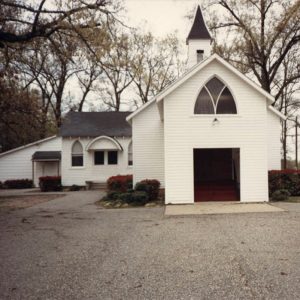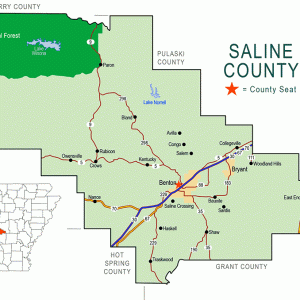calsfoundation@cals.org
Avilla (Saline County)
Founded by German settlers, the unincorporated community of Avilla lies in northern Saline County seven miles north of Benton (Saline County) on Congo-Ferndale Road. Centered around a Lutheran church and school, the mostly rural settlement also has a Baptist church and two stores.
The first white settlers in the area were farmers who gained land grants from the federal government before the Civil War. These settlers include Henry Fletcher, who arrived in 1834; Thomas Keesee, who arrived in 1839; and George Brown, who arrived in 1857.
Following the Civil War and Reconstruction, railroad companies, including the Iron Mountain Railroad, advertised the quality of Arkansas life in Germany and other parts of Europe. Among those who responded to these ads were a group from Saxony (a region in Germany between Prussia and Bavaria). Five men and one woman arrived in Saline County in 1881, building a communal log house they designated the Colony House and beginning a settlement they called Hope Colony (in German, Kilonie Hoffung). Eighty more settlers from Saxony arrived at the colony within a year, and the group founded Zion Evangelical Lutheran Church and School. The workers cleared trees; built log houses; grew cotton, corn, cabbage, and subsistence crops; and raised cattle and hogs. Festive occasions such as Christmas, Independence Day, and Mission Sunday were marked with decorations, dancing, and communal meals. A post office was established at Avilla in 1881; it was closed in 1911, with mail delivery rerouted to Alexander (Pulaski and Saline counties).
Men from the Avilla area fought for the United States in both world wars. Worship and education at the Lutheran church was conducted in German until the 1940s. By the 1960s, much of the farming in the area had become dairy farming. The community never incorporated or developed a downtown area, as residents easily traveled to Benton or to Little Rock (Pulaski County) for shopping and for most social activities. Early in the twenty-first century, the Lutheran school was renamed Avilla Christian Academy to attract a more diverse student body. The church also started a food pantry and a community garden. On May 22, 2017, a fire destroyed the original church building of the Lutheran congregation in Avilla. While the newer building was unharmed, the original church structure had been used for smaller services, as well as for office space and for the food pantry.
One of the noted past residents of Avilla is Albert Grafe, a painter who moved to Avilla in 1921 from Dresden, Germany. The Helmich, Hoffman, and Prange families are also noted as descendants of the original settlers from Saxony.
For additional information:
Dunnahoo, Pat. “German Colony Brings Old Country to Saline County.” Arkansas Gazette, November 22, 1964, p. 4E.
Hays, Sandy Miller. “German Community to Celebrate 1st Centennial.” Arkansas Democrat, Clipping, Vertical files. Butler Center for Arkansas Studies. Central Arkansas Library System, Little Rock, Arkansas.
Zion Evangelical Lutheran Church. http://www.zionlutheranavilla.org/ (accessed November 21, 2025).
Steven Teske
Butler Center for Arkansas Studies






At some point, it was also called Beaver Township. Albert Grafe is my grandfather.
Mark Hagge and I were reading your article about the German settlement in Avilla. The Hope Colony was settled with Germans from Dresden in 1881. My great-grandfather, Ernst Heinke, and his family arrived in Arkansas in 1881 from Dresden. They were listed on the New York Passenger List 1820-1957, roll 441, page 897. The ship, P. Caland, sailed from Rotterdam to New York, arriving September 10, 1881. As an interesting sidebar, August Hoppe and his family were listed on the manifest above the Heinke family. We were looking in the church history book today under baptisms and found a child of August Hoppe being baptized. A footnote listed Hoppe as being from Kolonie Hoffnung in Saline County.